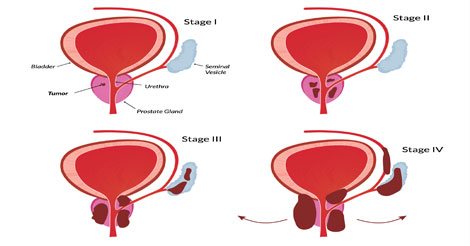Prostate Cancer - Symptoms, Causes, and Prevention
Prostate cancer is one of the most common cancers in men. They start growing slowly and are mostly restricted to the prostate gland without much harm. Although some types of prostate cancer need almost no treatment, other prostate cancers are fatal and they can spread swiftly. Prostate cancer when detected early has the best chance for treatment and successful recovery.

What signs and symptoms to observe?
Prostate cancer majorly show no signs or symptoms in its early stages, however, in its advanced stages, below given signs and symptoms show up:
- Problem while urinating and decreased force in urine stream
- Unexplained weight loss
- Blood in the urine or semen
- Pain in the bones
- Erectile dysfunction
What can put you at risk for prostate cancer?
- The risk increases with age, especially after 50
- Some ethnicities can increase the risk, for example, Black people have aggressive forms of prostate cancer
- Having a family history like a parent, or sibling had prostate or breast cancer, your risk may be increased.
- Obesity or being overweight can cause more aggressive prostate cancer and also cause it to relapse
What causes prostate cancer?
Prostate cancer can be caused by inherited gene mutations which means it’s passed through genes from your parents. It can also be caused by acquired gene mutations where some genes mutate during a person’s lifetime but not passed on to offsprings.
What to do to prevent prostate cancer?
- Simple lifestyle modifications can help you in preventing prostate cancer and also other diseases.
- Consume a well balanced, healthy diet that includes fruits, vegetables and whole grains
- Choose healthy meals and snacks instead of supplements
- Exercise regularly, it helps in improving your body functioning, mood and maintaining your weight
- Find out from your doctor about your risk levels for prostate cancer
- Get your annual full body health checkups that include tests like PSA for detecting prostate cancer
In case you want to understand more about your risks of developing prostate cancer, book the master health checkup package. Based on your health checkup report and doctor's consultation, you can modify your lifestyle and daily habits to improve the quality of your life and health. Remember, early diagnosis and timely treatment of prostate cancer can help you in leading a healthier and happier life.
.png)





